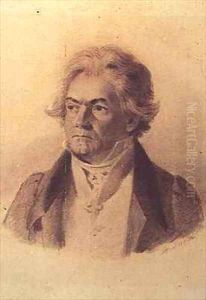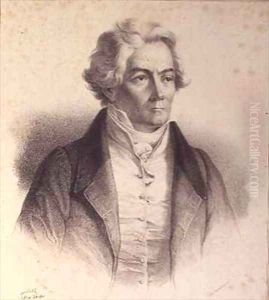Decker, Johann Stephan Paintings
Johann Stephan Decker was a prominent German-Austrian painter known for his exquisite portraits during the late 18th and early 19th centuries. Born in 1784 in the small town of Colmar, then part of the Holy Roman Empire, Decker showed an early aptitude for the arts. His initial training was under the tutelage of local artists, which laid the foundation for his future career. As he matured, his desire to perfect his craft led him to travel extensively across Europe, absorbing the diverse artistic influences of the time.
Decker's style was heavily influenced by the Neoclassical movement, which was predominant during his formative years. However, he managed to infuse his works with a sense of warmth and personal intimacy that set them apart from the more austere and impersonal works of some of his contemporaries. His portraits are particularly noted for their detailed representation of subjects, capturing not just their physical likeness but also hinting at their inner life and character.
In 1816, Decker's growing reputation as a portraitist led him to Vienna, Austria, where he eventually became a court painter. His position allowed him access to the highest echelons of society, and he painted portraits of several members of the Austrian and Hungarian nobility, including the Emperor Franz I and his family. These works solidified his reputation and are among his most celebrated pieces. Decker's ability to portray his subjects with dignity yet with a gentle human touch earned him widespread acclaim.
Despite his success, Decker's life was not without challenges. The political upheavals of the time and the changing tastes in art meant that he had to continuously adapt to maintain his standing within the artistic community. Nevertheless, Decker's legacy is that of a master portraitist who captured the spirit of his age with elegance and acute observation.
Johann Stephan Decker died in 1844 in Vienna. Today, his works are housed in museums across the world, serving as a testament to his skill and sensitivity as an artist. Through his portraits, Decker offers us a window into the soul of the European aristocracy during a pivotal moment in history, making his contributions invaluable to the study of European art history.

